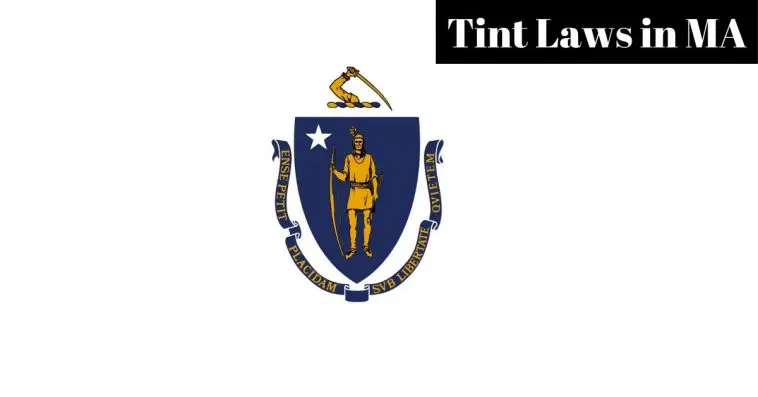Different states have different laws in place throughout the US regarding how you can tint your car windows.
If you’re considering tinting your windows for whatever reason, it’s worth being aware beforehand of what window tint regulations your state has established.
We’ll be going over the various laws concerning window tint in the state of Massachusetts, and we’ll also go over how you can get a medical exemption for tinted windows in Massachusetts if you need one.
TABLE OF CONTENTS
Are You Allowed To Have Tinted Windshield And Windows In Massachusetts?
Like most states, the state of Massachusetts does permit you to install extra tinting on your car’s windows.
However, no two states have exactly the same window tinting laws, so if you’re a Massachusetts resident, it’s necessary to know what specific laws the state has set in place.
In this section, we’ll go over the current laws in Massachusetts regarding window tinting.
What Is The Darkest Tint You Can Legally Get In MA?
For all car windows (with the exception of your windshield), you can’t tint your windows with anything less than 35% VLT tint.
VLT is short for “visible light transmission”; put in simple terms, it refers to how much light can pass through your windows.
The lower your VLT percentage is, the less light can pass through. A VLT of 35% means that only 35% of all the light that hits your window can pass through.
Windshields are not allowed to have any tint, with the exception of a strip of non-reflective tint at the top. This strip must be above your windshield’s AS-1 line, and it cannot be wider than 6″.
If you want to tint your rear window, your vehicle must be equipped with dual side-mirrors. While this shouldn’t be an issue for most vehicle owners, it’s worth remembering if you happen to own an older car that may not have dual side mirrors.
Is 20% Tint Illegal In MA?
Usually, any window tint with a VLT of less than 35% is illegal in Massachusetts. However, depending on your medical situation, it may be possible for you to get a medical exemption for this law and install a tint that is darker than what is usually allowed.
We’ll go over how to get a medical exemption for window tint later in this article.
Can You Get Pulled Over For Tinted Windows In Massachusetts?
If your windows are tinted beyond what the state of Massachusetts deems legal, and you don’t have a medical exemption for them, you definitely run the risk of getting pulled over.
If you’ve tinted your windows legally, you have the option of displaying a sticker in your windows that certifies the legality of your tint. While the state of Massachusetts recommends that you display such stickers, they aren’t mandatory.
How Much Is A Tint Ticket In MA?
A tint ticket in Massachusetts can be quite expensive; if you get pulled over and ticketed for having your windows tinted too dark, you can potentially receive a fine of up to $250. It may depend on how much darker your windows are compared to the legal limit.
If you are convicted three or more times for tinting your windows illegally, you’ll also face the additional penalty of having your driver’s license suspended for 90 days.
Window Tint Darkness In Massachusetts
We’ve already discussed what the maximum VLT for window tint is in the state of Massachusetts, but in this section, we’ll quickly summarize what we’ve mentioned so far.
Massachusetts has identical window tint laws for passenger vehicles and multi-purpose vehicles (MPVs), but it’s still worth it to clarify the difference between these two types of vehicles.
Passenger vehicles are designed mostly with simple transportation in mind; examples of passenger vehicles include sedans, coupes, station wagons, convertibles, and hatchbacks.
MPVs, as the name implies, are usually designed to have more than one main function; they provide transportation but may also have a more utilitarian purpose.
Examples of MPVs include minivans, cargo vans, pickup trucks, and camper vans.
For Passenger Vehicles
- Windshields can have a strip of non-reflective tint, which must be above the windshield’s AS-1 line and be no more than 6″ wide
- Front side windows must have a VLT of no less than 35%
- Backside windows must have a VLT of no less than 35%
- Rear windows must have a VLT of no less than 35%
For MPVs
- Windshields can have a strip of non-reflective tint, which must be above the windshield’s AS-1 line and be no more than 6″ wide
- Front side windows must have a VLT of no less than 35%
- Backside windows must have a VLT of no less than 35%
- Rear windows must have a VLT of no less than 35%
Window Tint Reflection In Massachusetts
The state of Massachusetts also has laws in place regarding how reflective your windows can be. Reflecting sunlight helps reduce glare and heat inside your vehicle, but too reflective windows can be a safety hazard for other drivers.
Only side windows can be reflective; windshields and rear windows can’t reflect any light.
Unlike most states, which prohibit the use of colored tints, Massachusetts has no laws regarding the color of the tint used on your windows.
For Passenger Vehicles
- Front side windows must not reflect more than 35% of light
- Backside windows must not reflect more than 35% of light
For MPVs
- Front side windows must not reflect more than 35% of light
- Backside windows must not reflect more than 35% of light
How Do You Get A Medical Exemption For Window Tint In Massachusetts
If you have a condition that results in an increased sensitivity to sunlight, you can claim a medical exemption for your window tint if you take the proper steps to acquire one.
First, you’ll have to get a signed certification from a licensed physician that proves that you have such a condition. You’ll then have to submit this certification along with a medical exemption application to the Massachusetts Registry of Motor Vehicles (RMV).
Medical exemptions can only be claimed for private passenger vehicles. In addition, extra tint can only be applied to your side windows and rear window; windshields cannot be tinted beyond normal regulations in any instance.
Conclusion
Every state has different laws concerning window tint. If you live in Massachusetts, you should know in advance what your legal limits are concerning window tint; this will potentially save you a lot of trouble and money in the future if you decide to tint your windows.
We hope we’ve been able to clarify for you what the laws are in Massachusetts regarding window tint. If you need any other information about Massachusetts’ motor vehicle laws, we suggest you check out the Massachusetts RMV website.




